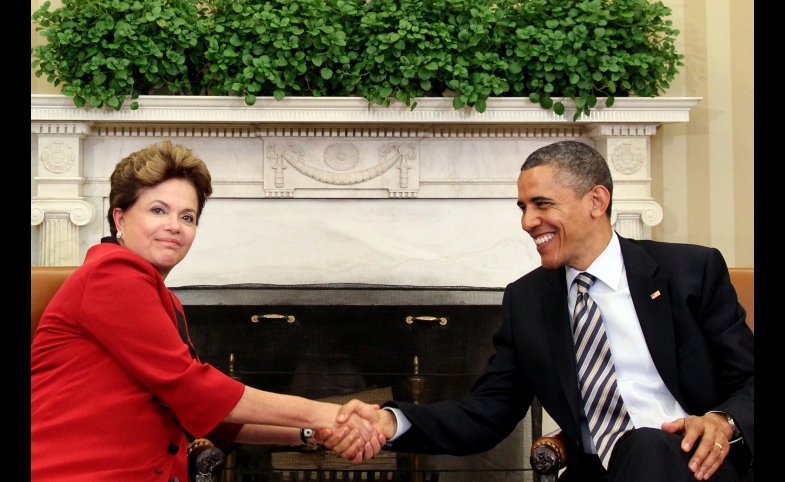Six years ago, a prominent British Muslim politician, Lady Sayeeda Warsi, argued that Islamophobia in Britain had passed the “dinner table test.” Never has this rung truer than today, for Britain and other Western...
KEEP READINGThe CPD Blog is intended to stimulate dialog among scholars and practitioners from around the world in the public diplomacy sphere. The opinions represented here are the authors' own and do not necessarily reflect CPD's views. For blogger guidelines, click here.

Is the U.S. Missing a Free Kick at the World Cup?
The World Cup offers something of a free kick for soccer diplomacy, which some observers say U.S. President Barack Obama is failing to capitalize on.
While many nations, from Germany to Russia, are sending their leaders to Brazil to make a diplomatic appearance, Obama is staying home. So is First Lady Michelle Obama and their soccer-loving children, all three of whom attended the 2012 London Olympics.
“It’s a diminished opportunity,” says Derek Shearer, a former ambassador to Finland under President Bill Clinton and current director of the McKinnon Center for Global Affairs at Occidental University, where he teaches a class on sports diplomacy. “Obama could have made more of it than he seems to be doing.”
To be sure, Obama did send Vice President Joseph Biden to attend yesterday’s match in Natal between the U.S. and Ghana. Today, the vice president is meeting with President Dilma Rousseff in Brasília. Biden also represented the White House at the 2010 World Cup in South Africa. But given that Brazil is the largest economy in South America and the U.S.’ neighbor, should Obama have made a bigger deal of the 2014 World Cup?
“Soccer is the world’s most popular sport and there’s no downside in having the president of the United States express his interest,” says Shearer, suggesting a few simple things that Obama might have done to extend an olive branch to Rousseff, such as filling out a tournament bracket as he’s done every year for NCAA basketball, or perhaps sending his wife and daughters to Brazil with a few top women soccer players like Mia Hamm and Julie Foudy.
But not all political observers see the point in playing soccer diplomacy with Brazil, given Rousseff’s increasingly tight campaign for reelection in October. Christian Lohbauer, a political scientist at the Universidade de São Paulo (University of São Paulo—USP), says Rousseff has no room to make any moves that might be construed as weak. He says this was the same motivation behind her decision last October to cancel the first official state visit to Washington by a Brazilian president in two decades after reports emerged that the U.S. National Security Agency spied on Brazilian citizens and companies, including the president herself.
“She and the Workers’ Party need a permanent tension on this topic for propaganda and political campaign purposes,” Lohbauer says. “Soccer diplomacy would not work very well these days.”
And in any case, adds Lohbauer, given everything else on Obama’s plate—from Iraq to the Ukraine, let alone domestic issues—why would the U.S. president bother interfering in Brazil when relations between Brazilian and American companies are going well?
You never know how a little bit of sports diplomacy can go a lot way, counters Shearer. He cites U.S.-Iran wrestling matches as easing political tensions; U.S. baseball players visiting Cuba as friendly moves toward the island nation; and, of course, the famous ping-pong matches between the U.S. and China that opened the door for Richard Nixon’s 1972 visit to Beijing. (To be sure, not all visits by sports stars to foreign nations are productive, as epitomized by former NBA star Dennis Rodman’s bizarre attempt at “basketball diplomacy” with North Korea last year.)
“I’ve found sports to be a very effective part of our diplomatic tool kit,” Shearer says. “I used sports myself when I was ambassador in numerous ways to advance U.S. interests.”
As ambassador to Finland, Shearer got active on the doubles tennis circuit with other diplomats, which is how he befriended the late Max Jakobson, a Finnish ambassador to the United Nations. That connection enabled Shearer to later facilitate the one request that former U.S. Secretary of State Henry Kissinger had when he visited Finland: to meet Jakobson.
“I arranged a small breakfast for the two of them,” recalls Shearer. “And later, when I accompanied the president of Finland to the United States, Kissinger hosted dinner at his house for him.”
Despite Obama’s decision to skip the World Cup in favor of a vacation this past weekend to Palm Springs that included a few rounds of golf, the president is still “committed to advancing the bilateral relationship with Brazil,” according to remarks that Biden made in an exclusive interview with Brazilian newspaper Folha de São Paulo. The vice president cited active dialogues on commerce, finance, agriculture, transportation, infrastructure, and education, as well as growing bilateral investment that has turned traditionally American brands like Anheuser-Busch, Burger King, and Pilgrim's Pride into Brazilian-owned companies.
“What this all means in practical terms is that U.S.-Brazil interests overlap significantly, and we should always be looking for ways to partner for the benefit of both our countries,” Biden said. “Brazil cannot and should not be isolated—that would go against our national interests, as well as the interests of the rest of the countries of the hemisphere.”
Obama’s invitation still stands for Rousseff to visit Washington, Biden added. In a sense, the (soccer) ball is in her field.
This piece was originally published by Americas Quarterly
Read the original article here.
Visit CPD's Online Library
Explore CPD's vast online database featuring the latest books, articles, speeches and information on international organizations dedicated to public diplomacy.
POPULAR ARTICLES
-
November 3
-
November 5
-
September 25
-
September 30
-
October 16
Join the Conversation
Interested in contributing to the CPD Blog? We welcome your posts. Read our guidelines and find out how you can submit blogs and photo essays >.













